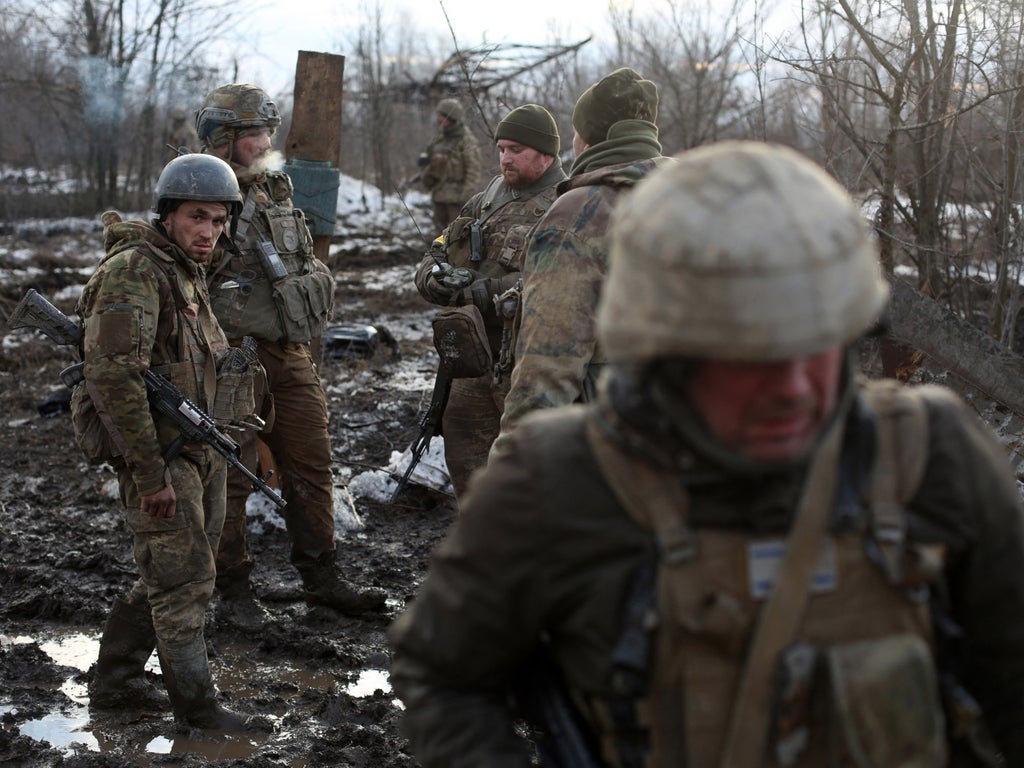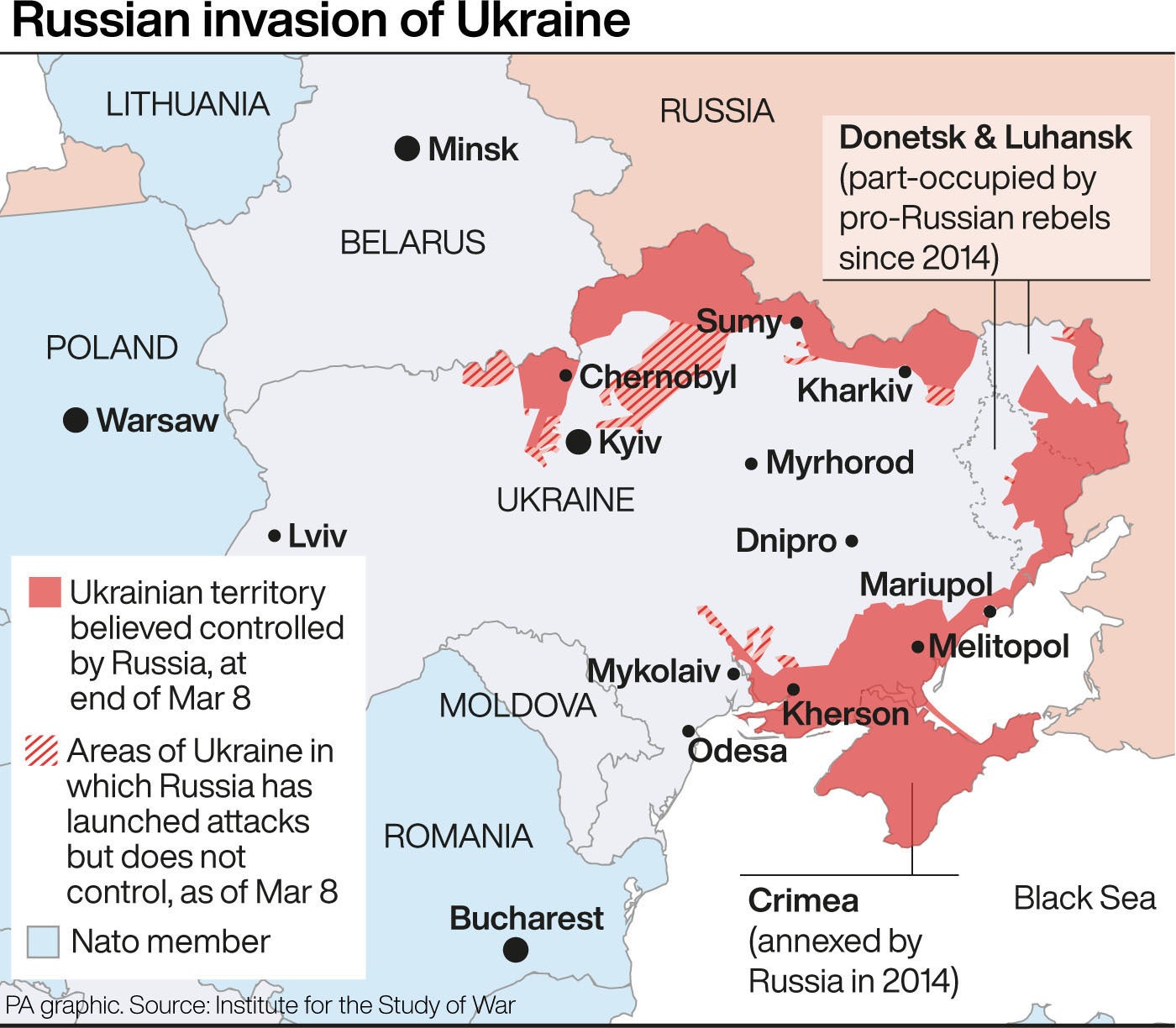
Fears are rising that Russia could open a western front against Ukraine by mobilising forces in a neighbouring breakaway state controlled by the Kremlin.
Ukrainian officials told The Independent there was a “real threat” that Vladimir Putin could instruct Russian troops based in Transnistria to cross the border and help launch an attack against Odesa, a key strategic port city based on the shores of the Black Sea.
Around 1,400 Russian soldiers are thought to be stationed in Transnistria, an unrecognised strip of territory that sits between Moldova and Ukraine. The state, which is made up of Russians, Moldovan and Ukrainians, is politically and militarily tied to Moscow.
“I think that such threats are real from the side of Transnistria,” Gennadiy Trukhanov, the mayor of Odesa, told The Independent. “Because there you can see the military forces of the Russian Federation. We may expect the possibility of offensive movements from here.”
Mr Trukhanov said he expected Russian troops would attempt to encircle his city from the direction of Mykolaiv, which sits to the east of Odesa and remains in Ukrainian control for now, and Transnistria, just 100km to the west.
Solomiia Bobrovska, a Ukrainian MP and former acting governor of Odesa, said the breakaway state could serve as a “second front” for Russia, despite its low of number of troops.
However, officials believe the Kremlin is unlikely to turn its attention to the Black Sea port, which has strong cultural and historical ties to Russia stretching back centuries, until it has succeeded in capturing other cities.
Once the likes of Mariupol, Donetsk and Kyiv have fallen, “after that they will come to Odesa,” Mr Trukhanov said.
Reports emerged in recent days that missiles had been fired from Transnistria, destroying Vinnytsia airport in central Ukraine. However, Odesa security officials dismissed this as “untruthful”.
Hanna Shelest, a Black Sea security expert who has advised the national government, said there was “no proof any military activity” in Transnistria, adding that there are “no such weapons” in the territory capable of firing long-range missiles into Ukraine.

“It was airstrike by air missiles from the area out of Ukrainian territorial waters,” she said.
Ms Shelest, who claimed to be in contact with the “top level” of Moldova’s Ministry of Foreign and European Integration, acknowledged the threat posed by Transnistria, but said it was unclear which way the state’s allegiance would fall in the context of war.
According to Moldovan intelligence, she said, roughly 50 per cent of armed forces in the territory are Transnistrians who have have been given Russian passports. “These people don't want to fight because they understand that they are losing everything,” she said.
“But they are under the control of Russian officers. So who is in charge? That is Russian officers sent from Moscow.
“We really hope that the fear of the locals will be stronger than the desire to satisfy Russia because the Transnistrian economy now really depends on the European Union.”
Any involvement in the war is likely to turn Europe against Transnistria and lead to the imposition of economic sanctions, as seen with Belarus – Russia’s only military ally in the invasion.
Ms Shelest said that the ammunition and military equipment stationed in Transnistria is also quite “old and in quite a bad condition”, but warned it was hard to know “the real situation” in the territory and determine how its forces could be utilised in a potential assault on Odesa.
For now, the city is preparing for the worst, Mr Trukhanov said, speaking via a secure military site in Odesa.
“We are storing our food. We are trying to install block posts and anti tank obstacles,” he said. “We have a special plan for the seaside. All Odesa beaches are minded. The whole coastline of Odessa has artillery batteries and tanks. Our battleships are ready to resist an attack.
“We are preparing the defence of our city, we are trying to make it better.”
According to officials, 150,000 citizens have so far fled Odesa, which is home to more than 1 million people, making it the third most populous city in Ukraine.
Ms Shelest said there have already been sightings of Russian saboteurs, who have attempted to plant military supplies in the city and carry out reconnaissance. However, Mr Trukhanov refused to be drawn on this, citing reasons of security.
The three major ports of the Odesa region account for 70 per cent of all Ukrainian exports, much of which are grain and vegetables. The city is also home to the headquarters of the Ukrainian navy, which relocated from Crimea after its annexation in 2014.
However, all port operations have been stopped amid the conflict, with Russian warships roaming the Black Sea in advance of an expected assault.
“They will use the sea and amphibious way to get the Odesa shores,” said Ms Bobrovska. “Their warship are staying in the Black Sea and people can can observe them.”
The wider Odesa region has already experienced brief and intermittent shelling, but none of this has been directed against its downtown, and nor has it compared with the intense bombing reported in Ukraine’s western cities.
Some have speculated that, because of the city’s cultural and historical ties with Russia, Mr Putin has held his hand in indiscriminately firing upon Odesa.
In the late 1790s, the empress Catherine the Great helped build the modern foundations of the city, which, to this day, continues to speak Russian as its main language.
“I suppose that they had a plan but it's only my opinion that they need Odesa not to be destructed by the fire, because it's a very symbolic city with architecture and other beautiful sites,” Mr Trukhanov.
However, he insisted that his city would be ready for any type of attack, adding that Mr Putin had “miscalculated” the strength of the Ukrainian resistance. “We must resist and we are getting ready for the escalation of the situation.”







